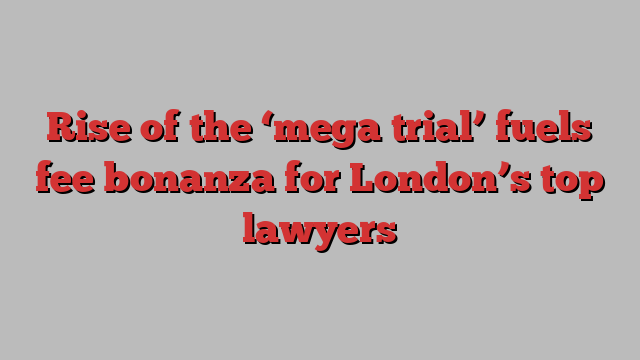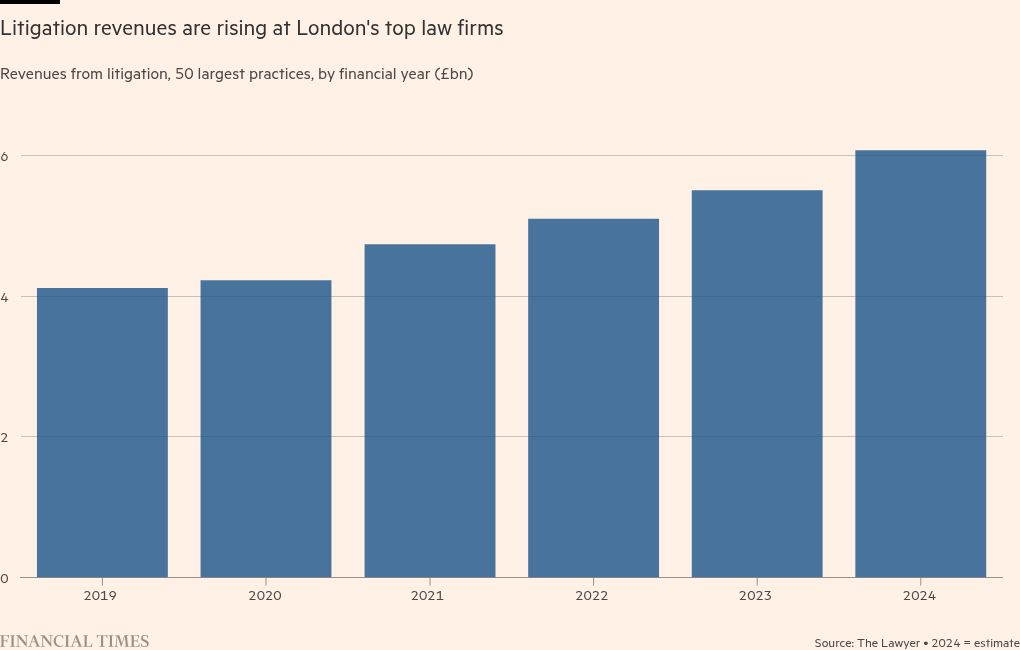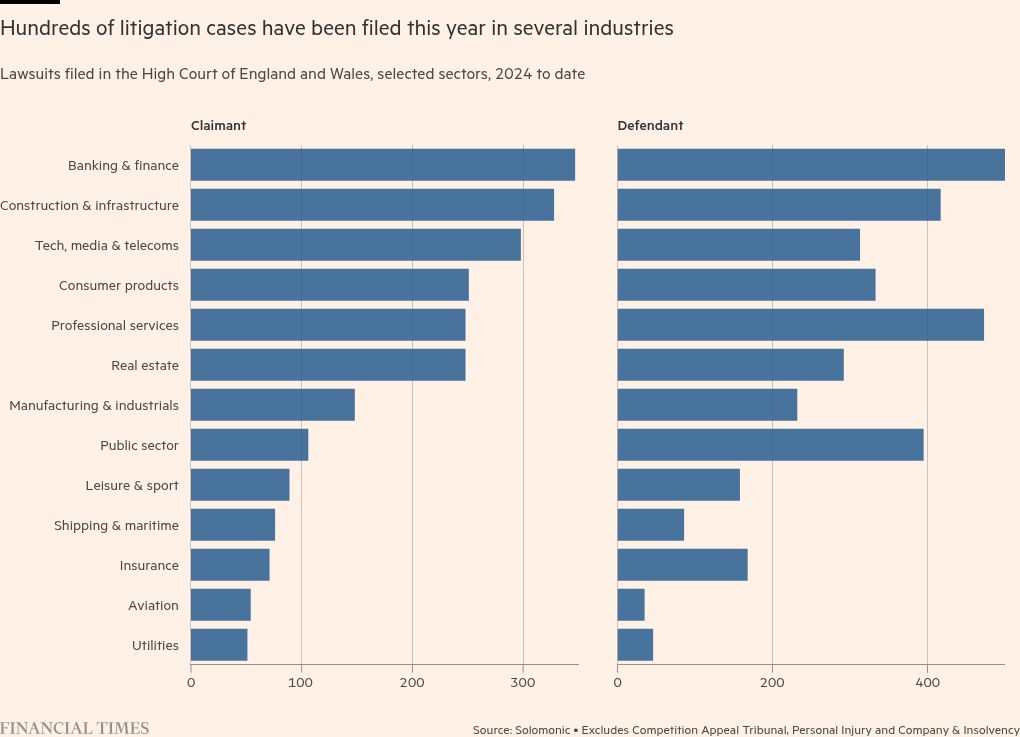
London’s top commercial courts are grappling with some of the highest value and most complex cases in English legal history, handing lawyers a fees bonanza but increasing pressure on an already-creaking justice system.
Cases being heard this month include the largest-ever mass lawsuit, against mining group BHP, and a “mega trial” pitting global insurers against aircraft owners over the bill for hundreds of planes stranded in Russia.
New cases keep coming: lawsuits worth a combined total of at least £83bn have been filed in the High Court since the start of last year, according to data from litigation analysis group Solomonic.
The rise in cases and their complexity is a testament to London’s enduring gravity as a legal centre, though critics argue it demonstrates a creeping Americanisation towards a more litigious culture.
These costly cases are a boon for law firms: the UK’s largest 50 litigation practices generated £6.1bn in revenues in their most recent financial year, 48 per cent more than five years earlier, according to estimates from researchers at The Lawyer.
Big winners include Clyde & Co, Herbert Smith Freehills, and Eversheds Sutherland.

Sam Townend KC, chair of the Bar Council, said a “spate of very high value, complex trials” was “a sign of real confidence in the country as a jurisdiction of choice for dispute resolution”.
Plaintiffs in the banking and finance, construction and infrastructure, and technology, media and telecoms sectors have brought the most number of claims this year, Solomonic data showed.
The $3bn stranded aircraft case, against insurers including New York-listed AIG and Chubb, is being heard in England even though the planes are stuck more than 1,000 miles away.
Some of the parties are located in the UK but several are not, including Dublin-based AerCap, the world’s biggest commercial aircraft leasing company. Parallel proceedings have also been brought in Ireland and the US.
Yet the boom is more than merely a continuation of the long-standing tradition — reflecting the enduring global pre-eminence of English law — for international litigants to turn to London.
Several of the recent cases, particularly mass action claims filed on behalf of consumers, would never previously have been brought, several lawyers said.
“Litigation is no longer regarded as an anathema” in England, said Christopher Robinson, partner in financial disputes at “magic circle” law firm Freshfields Bruckhaus Deringer. “We have a litigation culture today much closer to the US model than has historically been the case.”
More cases are being bankrolled by specialist companies and funds that have made a push into the UK over the past decade, driven in part by a wave of money from investors seeking juicier returns in the face of low interest rates.
Martyn Day, co-founder of law firm Leigh Day, said the rise of litigation funding had “undoubtedly made a big difference”. Social media also was a factor, he said, having made it easier for law firms to reach potential claimants.
Cases his firm is acting on include a lawsuit against the world’s biggest car companies, including Mercedes-Benz and Ford, over allegations that they tried to cheat emissions tests by using banned “defeat devices” on their vehicles.
Dozens of lawyers on the long-running case were in the High Court this week for the latest round of hearings, before the trial properly gets under way next year.
US investment manager Gramercy is funding the mining disaster case brought by law firm Pogust Goodhead against BHP, which has agreed to split any liabilities with Brazilian group Vale. A long-awaited civil trial is due to begin this month.
Critics argue it is lawyers and litigation funders, not claimants, that have most to gain from the rise in mass lawsuits. Kenny Henderson, partner at law firm CMS, said it was “questionable” whether some of the claims can “deliver meaningful access to justice”.
Day dismisses the suggestion, noting that extensive cuts to government legal aid had made privately funded litigation all the more important in allowing individuals to enforce their rights.
Given the scale of potential liabilities facing corporate defendants, he said, “it’s not surprising that they’re moaning”.

Whether or not the rise in big cases is to be welcomed, the country’s legal establishment is increasingly concerned about the system’s capacity to cope.
The justice budget was among the hardest hit by the Conservative government’s post-financial crisis austerity drive, with real terms funding per capita down 22 per cent between 2010 and 2023, according to the Bar Council.
High-end commercial cases are largely shielded from the chronic delays, chaotic administration and staffing shortages that afflict England’s criminal courts.
Still, the legal profession is unashamedly putting commercial litigation at the centre of its pitch for more funding, as chancellor Rachel Reeves prepares the Budget. Its industry representatives argue London will only attract more “mega cases” if the justice system as a whole — not just the high end of it — functions properly.
They warn that the venues for high-stakes litigation — the neo-gothic Royal Courts of Justice and its 21st century extension for commercial disputes, the Rolls Building — are feeling the strain from broad public sector funding pressures.
The Rolls Building “is known to have difficulties with temperature control and it suffered a major electricity shut down earlier this year,” Townend said. “The entire court estate, including the Rolls Building in which many of these trials will be heard, needs investment — and urgently.”
The City of London law courts — a new complex focusing on fraud and economic crime — is under construction on Fleet Street, although it is not scheduled to open until 2026.
The Ministry of Justice said that work “to fix issues in the Rolls Building has already started”.
It added: “The government stands firmly behind our world-leading legal services industry, which forms a vital part of our plan for economic growth.”
Nick Emmerson, president of the Law Society, added: “It is crucial that our justice system is properly invested in, and that the UK’s current pre-eminence as a legal centre is not left to wither.”
Additional reporting by Suzi Ring in London